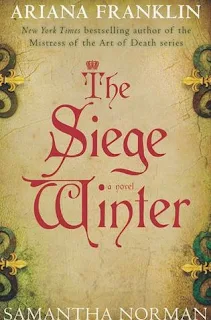“The Siege Winter” by Samantha Norman and Ariana Franklin – Men of God
Though the twelfth-century had very few places where a modern person would wish to be, it is safe to say that England would certainly never be one of them.
Engulfed in a civil war driven by greed, hatred and oh so much piety, the country faces a great internal turmoil as leaders struggle one against the other, with all the rest stuck in between, suffering and dying like flies for no cause.
The Siege Winter by Samantha Norman and Ariana Franklin is a piece of historical fiction literature set during that time, and it tells a story as grandiose as you would expect it.
In the beginning, it follows an archer named Gwyl who finds a young red-headed girl, abandoned and left for dead by a most sinister monk with very impure intentions. Dressing the girl as a boy and giving her the name of Penda, they venture onwards to find the beast that hurt her, with only a single piece of evidence to go on.
Quite soon though, their quest comes to a strange turn as they arrive in Kenilworth, a fortress belonging to a fifteen year-old girl by the name of Maud... a fortress about to be besieged for the long winter by the murderous Stephen.
During this siege where Maude is aided by her troops, Gwyl and Penda, many curious visitors end up in Kenilworth... including that devilish monk.
As you can guess, The Siege Winter is the sort of story that keeps the reader engaged on many levels, offering various narratives which differ visibly from each other and perhaps aim to portray a specific aspect of life back in those days.
For instance, the harsh world of the politicians is quite well demonstrated when Maud draws Stephen's ire for giving shelter to the empress all while the idea of there being no place remotely safe in that time being explored through the murderous monk.
In other words, through the stories of the various characters themselves the authors of the book also aim to provide some kind of knowledge as to how life was back in the day.
I have to admit that the authors did an excellent job when it came to concocting the proper atmosphere and fleshing out the characters in believable ways, whether they be likeable and relatable or not. From the very first lines we truly become entranced in this ancient and seemingly alien world, but one that still draws sparks of familiarity here and there.
The world becomes more and more real, more and more palpable with every description we are given, while the characters more and more important in the reader's mind as their story arcs advance.
In the end, The Siege Winter is most certainly a high-quality piece of historical fiction, one that will most assuredly cater to fans of medieval-era England who are looking to become entranced in the days of old and leave modern life behind, if only for a few hours.
Engulfed in a civil war driven by greed, hatred and oh so much piety, the country faces a great internal turmoil as leaders struggle one against the other, with all the rest stuck in between, suffering and dying like flies for no cause.
The Siege Winter by Samantha Norman and Ariana Franklin is a piece of historical fiction literature set during that time, and it tells a story as grandiose as you would expect it.
In the beginning, it follows an archer named Gwyl who finds a young red-headed girl, abandoned and left for dead by a most sinister monk with very impure intentions. Dressing the girl as a boy and giving her the name of Penda, they venture onwards to find the beast that hurt her, with only a single piece of evidence to go on.
Quite soon though, their quest comes to a strange turn as they arrive in Kenilworth, a fortress belonging to a fifteen year-old girl by the name of Maud... a fortress about to be besieged for the long winter by the murderous Stephen.
During this siege where Maude is aided by her troops, Gwyl and Penda, many curious visitors end up in Kenilworth... including that devilish monk.
As you can guess, The Siege Winter is the sort of story that keeps the reader engaged on many levels, offering various narratives which differ visibly from each other and perhaps aim to portray a specific aspect of life back in those days.
For instance, the harsh world of the politicians is quite well demonstrated when Maud draws Stephen's ire for giving shelter to the empress all while the idea of there being no place remotely safe in that time being explored through the murderous monk.
In other words, through the stories of the various characters themselves the authors of the book also aim to provide some kind of knowledge as to how life was back in the day.
I have to admit that the authors did an excellent job when it came to concocting the proper atmosphere and fleshing out the characters in believable ways, whether they be likeable and relatable or not. From the very first lines we truly become entranced in this ancient and seemingly alien world, but one that still draws sparks of familiarity here and there.
The world becomes more and more real, more and more palpable with every description we are given, while the characters more and more important in the reader's mind as their story arcs advance.
In the end, The Siege Winter is most certainly a high-quality piece of historical fiction, one that will most assuredly cater to fans of medieval-era England who are looking to become entranced in the days of old and leave modern life behind, if only for a few hours.
 | Diana Norman (25 August, 1933 – 27 January, 2011)Diana Norman was a British journalist and author who tried her hand largely at historical crime fiction. Ariana Franklin is a pen name under which she published a number of historical mystery books. Some of her better-known works include Pirate Queen, Blood Royal and The Death Maze. |
 | Samantha NormanSamantha Norman is a British freelance journalist and has authored articles and stories on a number of different subjects, ranging from boxing correspondence to theater and film critiques. So far she has authored two books, Fairy Tale Time co-authored with Nikolai Ustinov, and The Siege Winter, co-authored with her late mother, Diana Norman (pen name: Ariana Franklin). |








Comments
Post a Comment